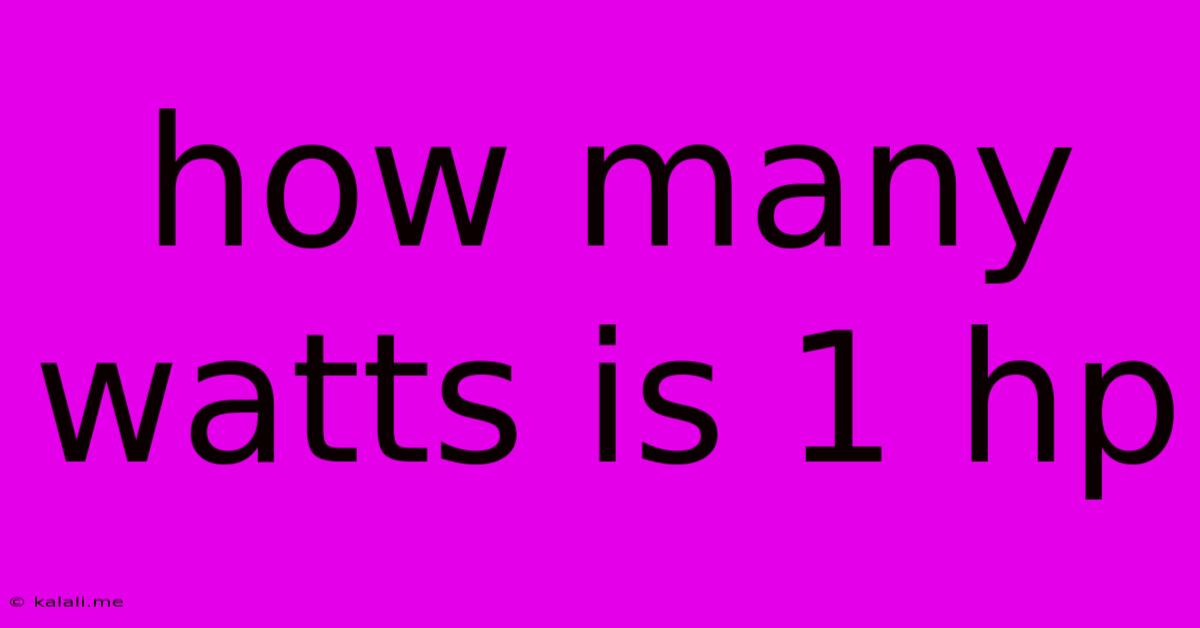How Many Watts Is 1 Hp
Kalali
Jun 12, 2025 · 3 min read

Table of Contents
How Many Watts is 1 HP? Understanding Horsepower and its Electrical Equivalent
Knowing the relationship between horsepower (hp) and watts is crucial for anyone working with engines, motors, or power systems. This article will clearly explain how many watts are in one horsepower, delve into the history behind this unit of measurement, and explore the nuances of this conversion. You'll learn to easily convert between these two units and understand the context in which this conversion is relevant.
What is Horsepower?
Horsepower (hp) is a unit of measurement of power, representing the rate at which work is done. It's a legacy unit, dating back to the late 18th century when James Watt needed a way to quantify the power output of his steam engines compared to the power of a draft horse. While seemingly simple, the conversion to watts isn't always straightforward.
The Conversion: Watts to Horsepower and Vice Versa
The most commonly used conversion factor is 1 horsepower (hp) = 746 watts (W). This is a mechanical horsepower (or imperial horsepower). There are other types of horsepower, such as metric horsepower and boiler horsepower, which have slightly different conversion factors. However, for most practical applications, the 746-watt equivalent is sufficient.
Therefore:
- To convert horsepower to watts: Multiply the horsepower value by 746. For example, 5 hp is equal to 5 * 746 = 3730 watts.
- To convert watts to horsepower: Divide the wattage value by 746. For example, 1492 watts is equal to 1492 / 746 = 2 hp.
Why is the Conversion Important?
Understanding the relationship between horsepower and watts is vital in various scenarios:
- Motor Selection: When choosing an electric motor for a specific application, you need to ensure that the motor's wattage is sufficient to meet the required horsepower. Incorrect wattage selection can lead to motor failure or inefficient operation.
- Generator Sizing: Similarly, when sizing a generator, understanding the wattage output is crucial for powering appliances and equipment with known horsepower requirements.
- Power System Design: In electrical engineering and power system design, converting between horsepower and watts is essential for accurate calculations and system optimization.
- Comparing Engine Performance: Knowing the power output of different engines in watts facilitates accurate comparisons regardless of the manufacturer's reporting unit.
Beyond the Simple Conversion: Factors to Consider
While the 746-watt conversion is a good starting point, there are nuances to consider:
- Efficiency Losses: Real-world systems always experience energy losses due to friction, heat, and other inefficiencies. Therefore, the actual power delivered might be less than the theoretical conversion suggests.
- Different Types of Horsepower: Remember that the 746-watt conversion is specific to mechanical horsepower. Other types of horsepower (metric, boiler, etc.) may have slightly different conversion factors.
- Peak vs. Continuous Power: Motors and engines can deliver peak power for short periods but might have a lower continuous power rating. Ensure you understand the difference between peak and continuous power ratings when making comparisons.
Conclusion
The conversion between horsepower and watts is a fundamental concept in various fields involving power and energy. While the simple conversion factor of 746 watts per horsepower is widely used and accurate for most purposes, always consider the factors discussed above for accurate calculations and practical application in real-world scenarios. Understanding these subtleties ensures more effective system design and reliable equipment operation.
Latest Posts
Latest Posts
-
Total Impedance In Series Rlc Circuit
Jun 13, 2025
-
Does University Of Toronto Require Sat
Jun 13, 2025
-
Which Of The Following Best Describes E Commerce
Jun 13, 2025
-
Second Most Abundant Gas In The Atmosphere
Jun 13, 2025
-
How Many Meters In 25 Miles
Jun 13, 2025
Related Post
Thank you for visiting our website which covers about How Many Watts Is 1 Hp . We hope the information provided has been useful to you. Feel free to contact us if you have any questions or need further assistance. See you next time and don't miss to bookmark.